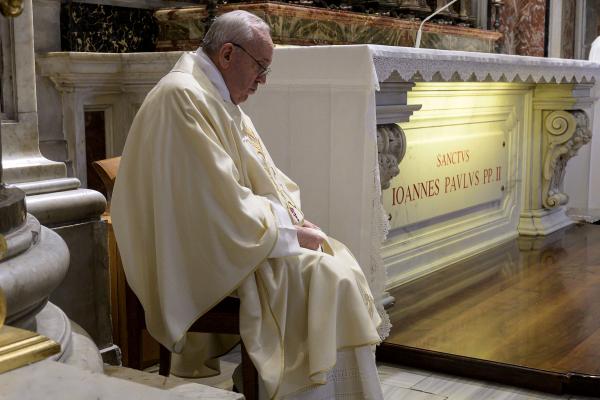“The urgent challenge to protect our common home includes a concern to bring the whole human family together to seek a sustainable and integral development, for we know that things can change.” Five years ago this month, Pope Francis, who follows in the footsteps of his namesake — St. Francis, the patron saint of ecology — wrote this call to action on climate in his encyclical, Laudato si’. In his call to action, Pope Francis said we must hear both "the cry of the earth and the cry of the poor."
On the 5-year anniversary of the pope’s landmark environmental message, we find ourselves in a global public health crisis. The coronavirus is sweeping the globe and upending lives. But as a Catholic advocate and activist, I feel that the pope’s words in Laudato si’ feel as relevant as ever because beneath the coronavirus pandemic a second and less visible crisis is unfolding: the Trump administration’s quiet assault on the environment.
If there is one thing we know about the Trump administration and crisis response it’s that what it lacks in preparedness, it makes up for in shameless opportunism. While the world has been rightfully laser-focused on the spread and impact of the coronavirus, the Trump administration has been using the pandemic as a diversion to roll back environmental safeguards.
Just in the past month, the Trump administration has quietly removed multiple important environmental protections. At the end of March, the administration dealt a final blow to long-standing regulations on auto emissions, lowering the standard by which auto companies would have to reduce emissions each year from 5 percent to just 1.5 percent. For comparison, that is a lower standard than the 2.5 percent a year that auto companies set for themselves without any regulation at all.
Worse still, the EPA — headed by former coal lobbyist Andrew Wheeler — recently announced that it will allow major polluter industries to regulate themselves during the pandemic. That’s right: power plants, petrochemical factories, and others will be left to determine for themselves if they’re meeting legal standards for air and water pollution. On the off chance a polluter company decides to tattle on itself, the EPA has declared that it will not issue any fines for violations.
While the Trump administration has dragged its feet to a ridiculous extent on its response to the coronavirus, it hasn’t missed a step in its brisk pace of auctioning off the right to drill for oil. Five years after the pope’s call for unity in caring for God’s creation, both humans and the planet we inhabit have never been more vulnerable.
Pope Francis blames the destruction of the environment on reckless pursuit of profits, writing: “When nature is viewed solely as a source of profit and gain, this has serious consequences for society.” What Laudato si’ doesn’t mention, though, is that money is also the reason our government allows environmental destruction to continue. Fossil fuel companies spend millions to lobby Congress against any regulations that might protect nature at the expense of their profits. In the past decade, the energy industry has spent over $1.3 billion on lobbying. The returns are stunning: an estimated $59 in tax breaks and subsidies for every $1 spent on lobbying, and zero federal climate bills passed in that time.
The administration’s shamelessly pro-polluter agenda is the embodiment of what Pope Francis condemns as “throwaway culture” in Laudato si’. “Throwaway” is an apt way to describe how the Trump administration is treating the environment, as something expendable that can be drilled, polluted, and piled with garbage as long as it keeps yielding a profit.
Above all, Pope Francis reminds us in Laudato si’ that nothing and no one is disposable; we are all connected, not least of all by the home we share. For Pope Francis, and for me as a Catholic, caring for our shared home is not a matter of opinion, but rather a principle at the very heart of the Church’s teaching on compassion and justice. This is a moment in our history where, more than ever, we should be caring for all of God’s creation: our neighbors, our families, our common home on Earth. We should not have to watch as wealthy interests game the system to put profits over both people and nature.
People of all faiths recognize this call to unite and save the planet. A vast majority of Americans — nearly 7 in 10 — want to see the government take action on climate change. The [ope articulated a reality that many of us see, that allowing the natural world to be limitlessly exploited for profit is the root of today’s climate crisis. This is why we urgently need to reform to curb the influence of polluter money in politics and pass H.R. 1. The bill, titled the For The People Act, would reduce the influence of big money and corporate lobbyists in politics, protect and expand the right to vote, and restore ethics and accountability to government. Before we can answer Pope Francis’s call for a government that does not treat anyone or anything as disposable, we must return power to those who will be the best stewards of God’s creation: the people.
Got something to say about what you're reading? We value your feedback!






